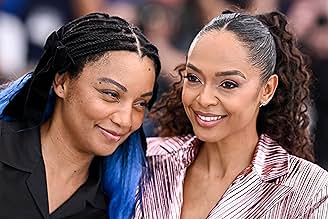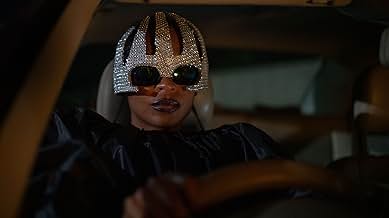Mitten in der Nacht stolpert Shula auf einer leeren Straße über die Leiche ihres Onkels. Als um sie herum die Beerdigung beginnt, bringen sie und ihre Cousins die Leiche ans Licht.Mitten in der Nacht stolpert Shula auf einer leeren Straße über die Leiche ihres Onkels. Als um sie herum die Beerdigung beginnt, bringen sie und ihre Cousins die Leiche ans Licht.Mitten in der Nacht stolpert Shula auf einer leeren Straße über die Leiche ihres Onkels. Als um sie herum die Beerdigung beginnt, bringen sie und ihre Cousins die Leiche ans Licht.
- Auszeichnungen
- 9 Gewinne & 12 Nominierungen insgesamt
Maggie Mulubwa
- Farm Club Presenter 2
- (as Margaret Mulubwa)
Empfohlene Bewertungen
This film is a small miracle of storytelling about the lives and trials of women and girls, the families that uphold them, and the societal dysfunction that holds them back. Gorgeous, heart wrenching, and subtle.
The acting is superb as the characters are richly and slowly revealed. Susan Chardy shines in her performance, portraying Shula with a quiet ferocity the role merits.
Though, I didn't know about guinea fowl before seeing the film, I will never think about them the same way again after seeing the film.
Director Rungano Nyoni has triumphed with this film, voicing the realities of the women of Zaire's lives in a story with global resonance.
The acting is superb as the characters are richly and slowly revealed. Susan Chardy shines in her performance, portraying Shula with a quiet ferocity the role merits.
Though, I didn't know about guinea fowl before seeing the film, I will never think about them the same way again after seeing the film.
Director Rungano Nyoni has triumphed with this film, voicing the realities of the women of Zaire's lives in a story with global resonance.
Let me first just say the female roles were impeccable, full of the kind of acting that transports the veiwer. The story despite its violent & disturbing undertone was written & directed with taste. Clearly there was a deep emotional disposition of the creators & theatrical cast. Unfortunately the decision to leave the final chapter of the episode to the users imagination comes off as cowardice.. You make a movie with intriguing turns that lead to introspective meditation, you make a difference by setting an example with a production that ultimately presents resolutions. Thisbis how trends in cultural & film are set that can actually change our world. Film, like music has the power to invoke lasting changes in our society that can transform the voice of society. I wish i could say the choice to choke the final wind from the sails of this narrative was an artistic one, but i came away feeling like it was made for many of the same reasons people stay silent about these very issues.. Fear of upsetting the crowd..
A pertinent fact about the little-known African bird known as the guinea fowl is that they have a unique, loud call that can be heard at quite a range, not only amongst their own kind, but also among all of the other animals within earshot. That can prove quite valuable both for the members of their own flock and for all other nearby vulnerable creatures when predators approach. While that may sound like useless trivia to some, it's a highly relevant metaphorical observation about the underlying narrative in this third feature effort from Zambian writer-director Rungano Nyoni. While driving home from a dinner party late at night on a remote rural highway, Shula (Susan Chardy) comes upon the dead body of her Uncle Fred (Roy Chisha) splayed out on the road. Somewhat surprisingly, she seems largely unaffected by what most would see as a shocking discovery. She calmly reports the incident to authorities and returns home, where she finds her relatives have begun preparing the residence for a traditional funeral gathering. Shula remains remarkably composed through all this, too, despite the many disruptions going on around her, especially incessant overblown outpourings of grief. Her relatives are somewhat offended by Shula's nonchalant behavior, upset that she doesn't show more remorse about her uncle's demise and isn't particularly respectful of their arguably overwrought mourning rituals. But, as a modern professional woman, Shula is not one to readily give in to these outdated conventions and exaggerated displays of hysteria, regardless of how time-honored and widely accepted they might be. What's more, as the story plays out, the reasoning behind Shula's cool demeanor becomes even more apparent: She hadn't spoken to Fred in years and wasn't on good terms with him - and for good reason. And, as she soon comes to discover through revealing conversations with relatives like her cousins Nsansa (Elizabeth Chisela) and Bupe (Esther Singini), those reasons become even clearer, making it apparent that Fred was arguably someone unworthy of the outpouring of angst directed his way. To make matters worse, Shula also sees that her family is just as culpable for the shamefulness behind the concealment of the many dirty little (and not so little) secrets that surface, terrible truths that have been long buried under successive layers of denial and shifted blame. Indeed, if family is supposedly everything, these are relatives with whom I'd rather have no contact. As a consequence, this is the kind of film that could easily prompt viewers to become justifiably outraged while watching it, both for the damning revelations that emerge, as well as its disturbingly frank portrayal of the deplorable treatment women are sadly accorded in this culture. Interestingly enough, however, the film manages to present this unsettling story with a deft fusion of drama and dark comedy (which may not seem quite so funny when all is said and done), coupled with tinges of surrealism (some of which work, some of which don't). Its greatest strength, though, lies in its message about the need for more of us to behave like the guinea fowl when circumstances warrant. To be sure, predators come in all forms, some of whom walk on four legs and others of whom only need two.
"Shula" (Susan Chardy) is returning from a fancy dress party late one evening when she encounters a corpse on the road. A quick investigation reveals the body as that of her "Uncle Fred". She doesn't appear terribly upset at the news and neither does her partying father when she calls to tell him! Her evening doesn't get any better with the arrival of her drunken cousin "Nsansa" (Elizabeth Chisela) and when the police tell her they don't have enough vehicles to come and deal with it til the morning, she has to sleep in her car. What follows now sees us immersed in some of the rituals and traditions of a Zambian funeral, with grief - real and not so real - presented in a semi-comedic mix of ancient and modern behaviour. What also become clear is that "Shula" has a reason for her indifference and that this family, indeed their whole village, has unsavoury secrets to keep. What was curious for me, given the nature of the man's behaviour, was the extent to which the men were largely oblivious and the women almost entirely defensive of his true nature. Not of his behaviour in life, but of his reputation thereafter. He was clearly no great loss, yet his sisters grieve profoundly and lay the blame for his death squarely at his much younger wife who obviously hadn't looked after him properly. What's this to to with a guinea fowl, you might ask? Well it appears that they frequently serve as an early warning system for wildlife when predators approach, and so the allegory with the characterisation of "Shula" is clear to see as the story shines a light on established patterns of behaviour that still consider women as chattels. Aside from some engaging light-relief from the almost permanently sozzled "Nsansa", there isn't really enough development of the personas here and there's also not so much dialogue, per se. Just a great deal of plausible family chatter, angst and wailing amongst a community that treats death respectfully as the photography gets it's sleeves rolled up and takes us quite effectively into this bereft commune where there are spoils to be had, too. A lot of this is left to our own imagination and judgement, which is fine but a little lazy on the part of the writers who maybe hadn't quite the courage of their convictions when it came to delivering a more directly potent thrust, but it's still well worth a watch.
Anyone with a Western mindset who claims to have no trouble discussing On Becoming a Guinea Fowl is lying. Watching this, I was reminded of Haile Gerima's words about the need for more local, identity-driven voices to portray Africa and its singularities. Once again, Rungano Nyoni does an excellent job in this regard.
It would be easy to be politically correct and say that patriarchy, gender relations, divisions, and victim-blaming exist in our societies too, manifesting in different forms. That's correct. Still, I can't help feeling that relativising this also relativises and minimises the unique pains of societies forced to navigate extra layers of traditions, rituals, and customs. These pains are even unique to people who moved away from those cultures, still missing the comfort of familial warmth and being understood, while living in a different world that, while undeniably more balanced in role distribution, remains cold to them. My background and life involve regular contact with other communities, rituals, and cultures, familiarising me with cultural aspects most Westerners aren't. Yet I'd still be incapable of writing something like this, as I'm far from carrying the weight of such identity and centuries of history. This is why it's perfectly natural to feel uncomfortable while watching this. We have many thoughts, we judge, we relativise, and it's almost impossible to put all of that into words.
The story is as powerful, disturbing and necessary as Nyoni's previous film, but the technical maturity on screen is evident, all while keeping her identity intact, rooting the film firmly in the context and society it portrays. And is this Susan Chardy's debut? Wow, impressive!
PS: That simple yet tense, and mysterious score is excellent. It reminded me of Edward Berger's recent films.
It would be easy to be politically correct and say that patriarchy, gender relations, divisions, and victim-blaming exist in our societies too, manifesting in different forms. That's correct. Still, I can't help feeling that relativising this also relativises and minimises the unique pains of societies forced to navigate extra layers of traditions, rituals, and customs. These pains are even unique to people who moved away from those cultures, still missing the comfort of familial warmth and being understood, while living in a different world that, while undeniably more balanced in role distribution, remains cold to them. My background and life involve regular contact with other communities, rituals, and cultures, familiarising me with cultural aspects most Westerners aren't. Yet I'd still be incapable of writing something like this, as I'm far from carrying the weight of such identity and centuries of history. This is why it's perfectly natural to feel uncomfortable while watching this. We have many thoughts, we judge, we relativise, and it's almost impossible to put all of that into words.
The story is as powerful, disturbing and necessary as Nyoni's previous film, but the technical maturity on screen is evident, all while keeping her identity intact, rooting the film firmly in the context and society it portrays. And is this Susan Chardy's debut? Wow, impressive!
PS: That simple yet tense, and mysterious score is excellent. It reminded me of Edward Berger's recent films.
Theatrical Releases You Can Stream or Rent
Theatrical Releases You Can Stream or Rent
These big screen releases can now be watched from the comfort of your couch.
Top-Auswahl
Melde dich zum Bewerten an und greife auf die Watchlist für personalisierte Empfehlungen zu.
Details
Box Office
- Bruttoertrag in den USA und Kanada
- 166.851 $
- Eröffnungswochenende in den USA und in Kanada
- 12.793 $
- 9. März 2025
- Weltweiter Bruttoertrag
- 237.397 $
- Laufzeit1 Stunde 39 Minuten
- Farbe
Zu dieser Seite beitragen
Bearbeitung vorschlagen oder fehlenden Inhalt hinzufügen

Oberste Lücke
What is the Canadian French language plot outline for On Becoming a Guinea Fowl (2024)?
Antwort


















